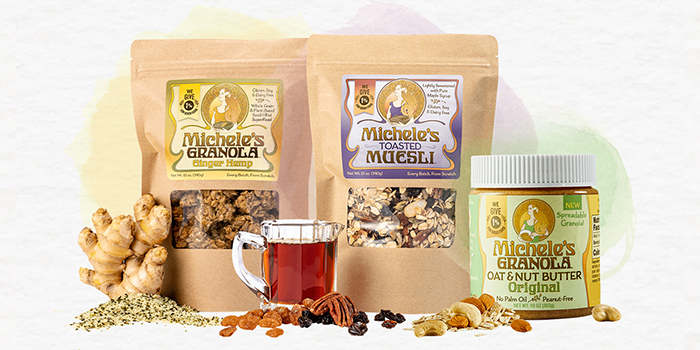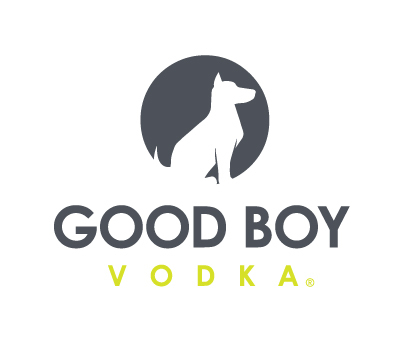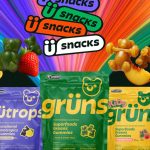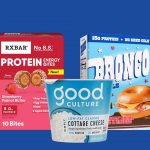“We Paced Ourselves”: How Michele’s Granola is Scaling Small Batch

Deeming 17-year-old Michele’s Granola an overnight success would be both far-fetched as well as an understatement. But unexpected explosive growth amid the early days of the pandemic has propelled the Baltimore-based business forward at a time when founder Michele Tsucalas believed it may have been slowing down.
“In a lot of ways, [at the time] we had seen some of our growth, particularly in e-commerce, hit a plateau,” Tsucalas explained. “That being said, in early 2020 we were still a small [somewhat] regionally-focused, Mid-Atlantic brand so we did see plenty of opportunities still before us.”
One of the primary challenges hindering the granola brand’s ability to act on those opportunities was its small-batch, handmade production process. Michele’s Granola currently makes an 8-SKU line of gluten-free, non-GMO granolas in flavors ranging from Lemon Pistachio to Ginger Hemp. The brand also makes a line of muesli as well two granola nut butters and sells its products both in retail and foodservice.
While the granola maker was working to redesign its production lines in accordance with COVID-19 safety standards, e-commerce sales suddenly quadrupled and pushed it to find a way to meet the heightened demand. Tsucalas said she had contemplated adding a second production shift in the past, but felt the logistics always made the idea seem arduous.
“COVID created that path for us,” Tsucalas said.”We had different [employees] with different personal circumstances [but] the second shift then created an opportunity for people to balance the challenges that they were facing in their personal life as a result of the pandemic. There were some serendipitous things that happened and we managed it by just understanding the needs of our employees.”
When Tsucalas started the company, she was neither a longtime CPG veteran nor culinary expert, but rather a business school graduate who in 2006, saw whitespace for a simple, clean ingredient, locally made granola while working at her local farmer’s market — typically a quintessential venue for local granola. Up until the pandemic, Tsucalas remained the sole leader of Michele’s, though she noted her team had been involved in every major decision she made along the way.
The company continues to professionalize operations, growing from less than 50 employees to nearly 100 over the past three years. It also hired its first CEO, Oliver Buccicone, and added a Director of Operations, Paul Manu. Tsuclas said while she figured out her strengths, weaknesses, likes and dislikes about running the business over the years, this leadership structure helped give her a new perspective on the company’s daily operations.
“The biggest challenge for me was not getting stuck in my ways of thinking about how we need to do things,” said Tsucalas. “It’s hard to get out of that, but having new leadership on my team has really helped balance a different perspective and understand that we can operate well and continue to grow in this new paradigm.”
Tsucalas started the company out of her home kitchen and began selling at farmer’s markets, co-ops and small independent and regional grocers. Within about three years, the brand got on shelf at select Mid-Atlantic Whole Foods locations and, after nearly a decade of working with the retailer, was finally brought on as a global account.
Whole Foods was Michele’s only national partner until the pandemic, but in the years since the brand has expanded to nearly 3,500 stores nationwide including Giant, Kroger (including banner stores), The Fresh Market, Sprouts and Wegmans. Tsucalas said that prior to the pandemic she sometimes felt the business was being held back by its retail partners, but she now sees that the initial, slower distribution allowed the company to develop more thoughtful and sustainable partnerships.
“While that was hard, we paced ourselves and our growth based on the opportunities that were in front of us and we always had really clear communication [with retail partners],” she said. “We also understood that we needed to prove ourselves – our ability to sustain our brand and our ability to meet changes in demand – before we could grow into new and bigger opportunities.”
Michele’s current facility is now undergoing its third expansion in order to keep up with those bigger opportunities. On average, the company produces 30,000 pounds of its small-batch, handmade granola per week and is on track to continue growing sales by about 25% and hit $15 million in net sales this year.
But change has been slow elsewhere at Michele’s. The granola, which retails for $7.99 per 12 oz. bag, has been made with the same ingredients since its inception – a combination of gluten-free oats, coconut, almonds, brown sugar, sunflower seeds, canola oil and vanilla. According to Tsucalas, she never considered changing the recipe or the manufacturing process because “if we sacrifice any of those things, we are going to lose our competitive edge.”
In scaling up the small batch process, the brand has found room to expand its portfolio and experiment with new limited time flavor launches, which Tsucalas said have also been used to test consumer demand for new SKUs. As the company has grown, it has also seen consumer demand stretch into new channels outside the natural space and sees increased demand from conventional retail buyers.
Looking to the future, Michele’s Granola wants to continue growing at its steady pace while maintaining its core values which are centered around its sourcing, production and labor force practices. The company has been funded to-date through its own earnings as well via traditional loans from a community bank and does not currently have any equity partners.
“We had a really strong financial discipline all the years before COVID and that has helped us weather some of the storms related to rising input costs, labor costs, supply chain costs,” said Tsucalsas. While the company has faced its fair share of challenges, she believes it will be able to sustain itself for the long run. “We want to continue to follow the demand and as long as there is growing demand for our products and new opportunities for us, we want to rise to that occasion.”


















